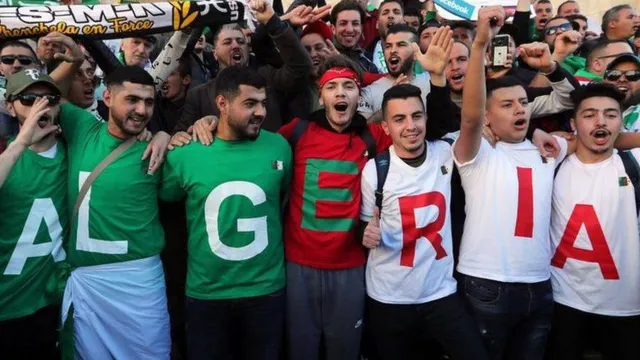Despite being a doctor who runs his own clinic in Algeria, Adlan does not stop thinking of emigrating to Europe as he doubts that Saturday’s presidential election will usher in a new era of democracy and prosperity in his home country.
“I am bitter and disappointed,” Dr Adlan, who preferred not to give his surname, tells me when I meet him in a cafe in the capital, Algiers.
And yet five years ago his hopes – like those of many other Algerians who were part of the Hirak movement – were high that freedom and democracy were at hand.
A father of two, he regularly participated in a popular uprising that forced Algeria’s longest-serving president, Abdelaziz Bouteflika, to step down after 20 years in power.
“I protested for nearly 50 Fridays in a row. We wanted our voices to be heard, we dreamed of accountability,” Dr Adlan says.
But today, the situation in Algeria is not very different from what has happened in other North African states such as Egypt and Tunisia following the Arab Spring, which was aimed at ending authoritarian rule.
Algeria’s street protests failed to diminish the power of the military, influential since independence and which continues to pull the strings.
President Abdelmadjid Tebboune, 78, is widely seen as being backed by the generals and won elections in 2019 after Mr Bouteflika was forced to step down.
He is expected to easily secure a second term in the poll being contested by two other candidates – Abdelaali Hassani, head of the Movement of Society of Peace, and Youcef Aouchiche, who leads the Front of Socialist Forces.
The election commission disqualified 13 candidates – including Zubaida Assoul, a lawyer and an opposition party leader who took part in the 2019 protests.
Zubaida AssoulBBC
How could any candidate collect 50,000 endorsements in one month, during summer vacation, and in a huge county like Algeria?”
Zubaida Assoul
An opposition leader the election commission disqualified from standing for president
“The authorities don’t want to hold real elections that can bring about solid change,” she says.
“All the states resources have been dedicated to the president’s campaign.”
The law required candidates to collect 50,000 signatures from registered voters, across various provinces, or 600 signatures from members of parliamentary and local councils, to qualify to run for the presidency.
Ms Assoul believes the requirements were intended to make it insurmountable for candidates like her to contest the poll.
“How could any candidate collect 50,000 endorsements in one month, during summer vacation, and in a huge county like Algeria?” Ms Assoul says.
But Abdelrahman Saleh, the head of a party that supports Mr Tebboune, dismisses her criticism.
“They failed to complete the required documents, and tried to find an excuse for their failure. I wish they were responsible enough, to admit that they couldn’t convince voters,” he says.
AFP Women walk past a notice board depicting posters for presidential election candidates incumbent President Abdelmajid Tebboune (L) and the Socialist Forces Front’s Youcef Aouchiche, in the centre of Algiers – 5 September 2024AFP
Very few campaign posters are up in Algiers and there is not much of a buzz about the election
Dr Adlan tells me that dozens of his fellow doctors have left for Europe in the past five years.
Algerians are largely French-speaking, so their favourite destinations are usually France, and sometimes, the French-speaking provinces in Canada.
While some Algerians follow the legal route to search for a better life abroad, others make the risky journey, via the Mediterranean, to reach Europe’s shores.
“Thousands jump into dinghies, throwing themselves into the unknown because they can’t stand their life here anymore,” Dr Adlan says.
Although there are no accurate figures, illegal migration has always been a deeply rooted problem across North Africa.
Many of the youth cannot take their dire living conditions anymore. Despite its natural wealth of oil and gas, youth unemployment in Algeria is above 30%, according to the International Labour Organization.
President Tebboune has promised to create more jobs if he wins a second term, but his critics doubt if he can fix the chronic problem of unemployment and bring about economic prosperity.
Getty Images Students chant slogans during a demonstration in the centre of the Algerian capital, Algiers, on 23 February 2021, the day after the second anniversary of the Hirak protest movementGetty Images
Young people have been at the forefront of demands for change in Algeria
I ask Dr Adlan if he is going to vote – he is one of nearly 24 million registered voters. But he tells me he is undecided.
Next to him sits AbdelWakeel Blam, a journalist who also took part in the 2019 protests. He says he is boycotting the polls.
“How can we have a fair and democratic election, when journalists and activists go to jail over a social media post?
“I had to quit a couple of jobs, due to restrictions on freedom of expression,” he says with a voice full of anger.
But pro-government voices reject such criticism. Mr Saleh says that only people who violate the law are prosecuted.
“No journalists are held behind bars in Algeria due to their work. Neither are there any politicians detained because of their political views. It’s all about breaching the law,” he says.
Voting will take place between 07:00 GMT and 16:00 GMT, with preliminary results expected on Sunday. If no candidate wins an absolute majority, a second round will be held between the two leading candidates.
As I walk around in Algiers, I spot very few campaign posters and banners.
I ask some people why more of a campaign buzz does not exist.
“What for? We all know who the winner is,” one of them replies.
